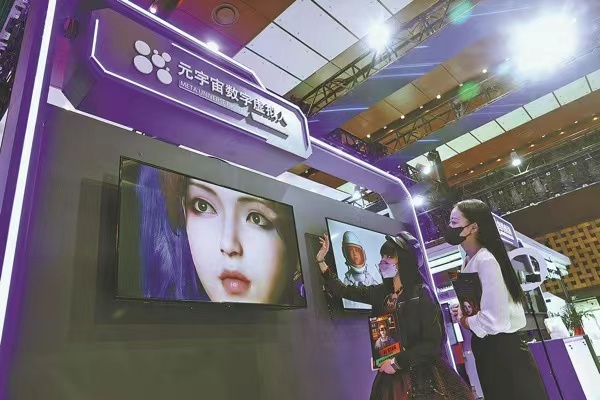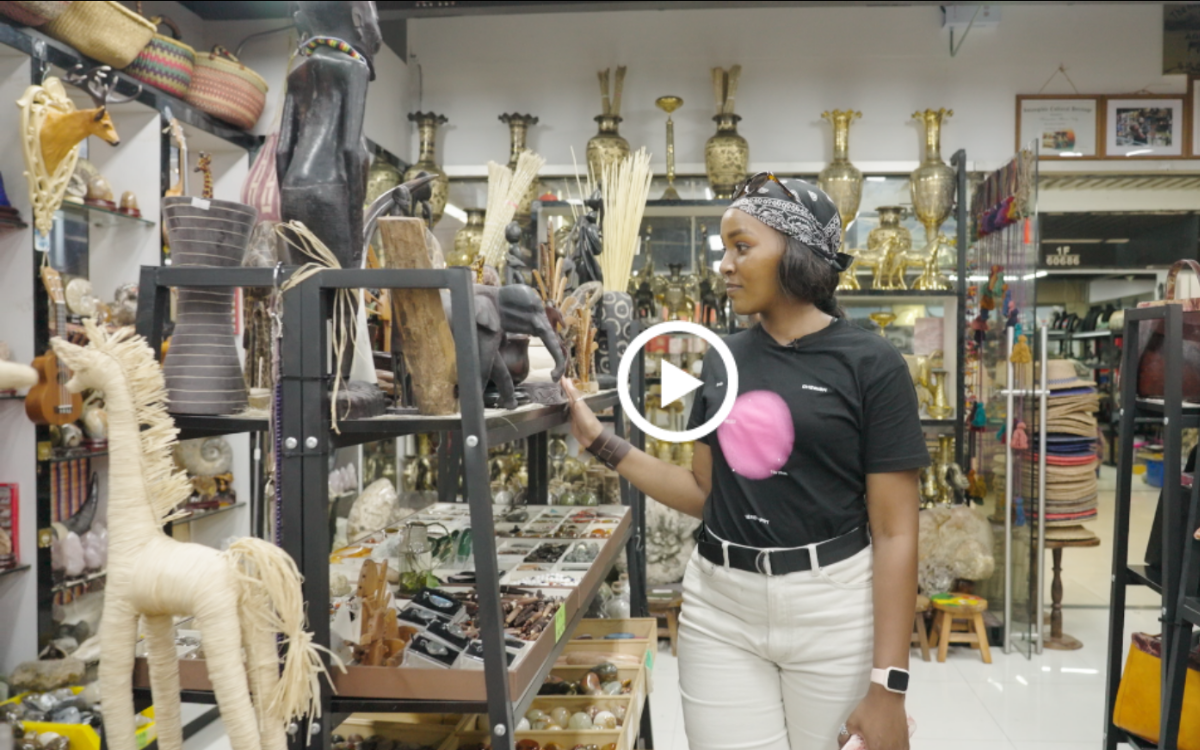Experts, insiders bullish on prospects of metaverse

Visitors interact with a virtual character at a booth promoting the metaverse during a high-tech expo in Beijing in July. CHEN XIAOGEN/FOR CHINA DAILY
Thanks to a huge netizen base, powerful 5G network and advanced manufacturing capability, China's metaverse market is forecast to embrace a bright future, industry insiders said.
Yu Chen, managing director and partner at Boston Consulting Group and also a core member of the firm's technology, media and telecommunications practice, said, "With key technological breakthroughs, some third-party institutions estimate that the industry in China will reach 200 billion yuan ($28 billion) in five years."
Currently, the market scale of China's metaverse industry is around 40 billion yuan, according to the Annual Report on Metaverse Development in China 2022, which was published by the Social Sciences Academic Press.
Yu, holding a positive attitude toward the industry, said, "In the coming five years, the development of the metaverse in China is comparable to that of smartphones during the past decades."
Yu Jianing, executive director of the metaverse industry committee at the China Mobile Communications Association, said: "During the last round of development of China's mobile internet, a multitude of excellent technology companies emerged. They had accumulated vast resources and experience in scientific innovation, which serve as key elements for driving China's metaverse development."
"Along Chinese enterprises' development path, specifically, there are some niche tracks worth being invested in," Yu from BCG said.
Yu from BCG noted that based on the construction framework, the target investment track of China's metaverse market is mainly composed of technology components, interaction portals and content.
"Interaction portals of the metaverse are the media that transmit the virtual experience to users. They often appear in the forms of extended reality equipment such as augmented reality and virtual reality equipment."
According to BCG's report, as early as 2012, Google launched its XR head mount display Google Glass. Numerous manufacturers followed the lead and acquired XR equipment production capability.
As the concept of the metaverse went viral, a boost in XR equipment development appeared in 2021. Between 2018 and 2020, annual global shipments of XR equipment were around 5.5 million units to 6 million units. However, in 2021, the figure jumped to 11.2 million units, nearly doubling the level of the previous year. Shipment value reached $5 billion, data from BCG showed.
"The climax to the investment in China's XR equipment sector came in 2021 also, with a total of 107 deals of financing. The total investment was 28.1 billion yuan, up 208.8 percent year-on-year," said BCG's report.
Yu from BCG said: "XR equipment research and development and manufacturing is a current investment hot spot in China, as certain technical bottlenecks weren't resolved. For example, AR equipment and VR equipment are still big and heavy and not comfortable enough for consumers to wear. The optical projection module in VR equipment still causes dizziness during long-term wear.
"Both startup businesses and major technology companies in China are striving to break the technical barriers, generating an investment hot spot in the XR equipment sector."
Rokid Inc, a Hangzhou, Zhejiang province-based high-tech company, is among the first batch of Chinese technology companies to start research and development of XR equipment. In 2016, Rokid's R-Lab was founded, focusing on optical image recognition and AR technology R&D. In 2018, its AR glasses — Rokid Glass — were released, being the first mass-produced AR glasses in China.
Misa Zhu, founder and CEO of Rokid, said that most of the investment the company attracted was injected into R&D, as it has been striving to produce AR glasses that are light, comfortable and attractive to make consumers want to wear the glasses for extended periods.
The weight of the latest version of Rokid's AR glasses, Rokid Air, is 83 grams — quite an impressive result in the industry. Zhu said that to cut down the weight of the product, the company worked hard on the design and optimized the space inside the AR glasses.
The recent Nov 11 shopping festival testified to the success of Rokid Air. Data from the company showed that during the shopping festival, over 10,000 units of Rokid Air were sold.
Yu from BCG said: "The development of 2B scenarios is also worth investing in as enterprises are looking for industrial solutions that take advantage of the metaverse."
"For example, medical companies are considering using VR technology to preplan and rehearse a surgery; while airline companies wish to use the metaverse to train their pilots."
Speaking of the future development of China's metaverse, Yu from BCG suggested that apart from breaking technical barriers, policy guidelines and industry standardization from laws and regulations are needed.
"Chinese technology companies will take the route of designing technology at the bottom level differently from the rest of the world. Using their own advantages, they should accelerate their pace, effectively break down technical bottlenecks and mass produce cost-effective XR equipment to capture market opportunities," he added.
Zhu from Rokid, said: "There is still a long way to go. Currently, XR glasses can only be applied in specific scenarios. To equip them with full capabilities will be highly demanding in the technical process, production capability and materials, including semiconductors."
When asked about whether or not the company is worried about "bottleneck" problems in chips, he said: "We are taking a localized route, cutting the risks of relying on advanced imported materials. So far, we haven't encountered 'bottleneck' problems. In the long run, we expect the overall environment to improve. Let's give it a little time and confidence."
Chen Jia, an independent researcher in international strategy, said, "The past months have witnessed the bumpy development of the metaverse industry globally. Compared with the rest of the world, the market in China has achieved the most development, especially policy-wise."
In 2022, the governments of Beijing and Shanghai, and the provinces of Jiangsu, Zhejiang, Shandong and Fujian launched guidelines and action plans for metaverse sector.
"With the central and local governments vigorously promoting the industry, enterprises actively participating and consumers' knowledge about the metaverse deepening, the market is expected to embrace exponential growth," said Hong Yong, associate research fellow of the e-commerce research department under the Ministry of Commerce.





 play
play